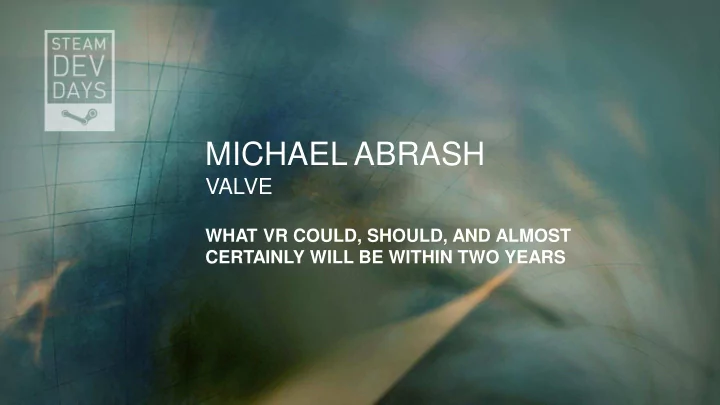

MICHAEL ABRASH VALVE WHAT VR COULD, SHOULD, AND ALMOST CERTAINLY WILL BE WITHIN TWO YEARS
The near future of virtual reality • VR is likely to be here sooner than you think • We’ve learned this from our R&D • We’ve built a hardware prototype that creates presence
The near future of virtual reality • Presence is VR magic • We think people are going to want presence badly
The near future of virtual reality • The same hardware reduces motion sickness • This hardware makes it possible to create incredible VR experiences that won’t make people sick • We believe that a consumer version is feasible within two years
Who might ship this? • Oculus is the obvious candidate • The DK1 is a good first step, but not good enough • Crystal Cove is a big step in the right direction Resolution, latency, persistence, translation Low persistence driven by Valve prototyping Valve and Oculus collaborated on tracking • We’re continuing to work with Oculus to drive PC VR forward
Implications of presence • VR could evolve into a major platform • Presence could tip the balance of the entire industry toward computer entertainment • Presence requires a head-mounted display connected to lots of local compute power • The PC is going to be the best place for VR
Decide for yourself • Try it for yourself and decide what you think the future looks like • mabrash@valvesoftware.com
WHAT DOES IT TAKE TO MAKE VR COMPELLING?
Murray, S.O., Boyaci, H., and Kersten, D. (2006). The representation of perceived angular size in human primary visual cortex. Nature Neuroscience. 9, 429-434. doi:10.1038/nn1641 Fang, F., Boyaci, H., Kersten, D., and Murray, S.O. (2008). Attention-dependent representation of a size illusion in human V1. Current Biology, 18 (21), 1707-1712. doi:10.1016/j.cub.2008.09.025 http://www.bilkent.edu.tr/~hboyaci/Vision/SizeAppletLarge.html
http://www.echalk.co.uk
http://www.echalk.co.uk
Presence • The sense that you are really someplace else • More than just immersion • Can only understand by experiencing it
Presence • Varies from person to person • Has gotten stronger as technology has improved
Presence • It’s why we’re so excited about VR • Powerful at a visceral level • Unique to VR • Likely to be the key to VR’s success
All of the following are needed • A wide field of view • Adequate resolution • Low pixel persistence • A high enough refresh rate • Global display • Optics • Optical calibration • Rock-solid tracking • Low latency
A wide field of view • Immersion • Peripheral cues • At least 80 degrees • More is better
Adequate resolution • Problematic for VR due to wide field of view • One-seventh the pixel density per degree of a wide-screen TV • 1080p works • More is better
Low pixel persistence • Necessary to avoid blurring with eye motion • No more than 3 ms
Smear from persistence
A high enough refresh rate • Necessary to avoid flicker with low persistence • 95 Hz seems to be sufficient • Somewhat less than 95 Hz may be adequate
Global display • Illuminates all pixels simultaneously • Avoids motion-induced compression, stretching, and skewing • Rolling display may work, but will have failure cases without low-latency eye tracking
Optics • Only one or at most two lenses per eye • Not enough to allow simultaneous control of Focal length Viewing distance Size Distortion Various forms of aberration
Optics • Search for best tradeoffs in a huge space • Evaluation has to be done by a human
Optical calibration • The human visual system is amazingly sensitive to deviations • Many problems are impossible to identify until calibration is nailed
Tracking • Must support translation (position in x, y, and z) as well as orientation • Position with at least millimeter accuracy • Orientation with at least quarter-degree accuracy • Volume at least 1.5 meters on a side
Low latency • 20 ms motion-to-last-photon works • 25 ms may be good enough
Presence is emergent • All of these factors have to be good enough • No one factor is enough by itself
SO WHEN IS PRESENCE COMING?
Feasible 2015 consumer HMD • 20 ms motion-to-last-photon latency • 3 ms pixel persistence • 95 Hz refresh • 110-degree FOV • 1K x 1K resolution per eye • High-quality, well-calibrated optics • Tracking millimeter-accurate resolution translation quarter-degree-accurate rotation volume of roughly 2 meters cubed
Presence in 2015 • We’ve built prototypes to this spec • We believe the technology is transferable to consumer-priced head-mounted displays • We’ll share what we’ve found with PC companies that want to develop VR hardware
There’s a lot left to be done • Improve every key element Up to 100X resolution would help Optics are far from optimal Head tracking isn’t fully solved Eye tracking is far from solved • Solve per-user lens positioning (IPD, eye relief) • Get rid of the tether • Get a display manufacturer to make VR-optimized panels
There’s a lot left to be done • 3D audio • Haptics • Body tracking • Input • Especially the interaction between input and game design in VR
VR software • Movement • Gameplay • Multiplayer Could be the best online social experience yet • Content
This is where you come in • Could be one of the biggest platform shifts ever • Platform shifts create opportunities • Great VR requires custom experiences • Someone is going to write the DOOM of VR
The PC will be the hotbed for VR • PC – Linux, Windows, OSX - will be the VR epicenter Rapid evolution • Already happening with the Rift Many developers and IHVs, with complete freedom to innovate Most powerful platform, and getting more so Valve will continue to help drive VR on the PC & Steam forward
Takeaway • A great VR system at a consumer price in 2015 is primed to happen • It will happen, in 2015 or soon after
Thank you • Find more information and join the conversation at http://blogs.valvesoftware.com/abrash/
Recommend
More recommend